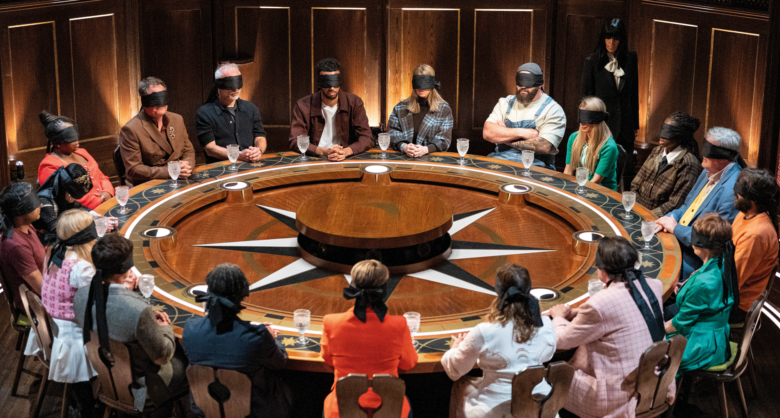The happy psychopathy of The Traitors

Photo by BBC/Studio Lambert/Euan Cherry
The moment I knew I was going to enjoy The Traitors was a moment I suspect a lot of people felt the same: when Nicky, the faithful banished at the very first roundtable back in 2022, explained that the reason she hadn’t raised a glass to join a toast in a manner that so many of her fellows found so deeply suspicious was because she – wait for it – literally didn’t have the necessary arm. As an insight into prejudice, herd behaviour and mind-blowing human stupidity, you’d really struggle to top that.
The moment the show went from guilty pleasure to uncomplicated love, though, is something you’re less likely to remember. A man named Rayan was having a claustrophobia-induced panic attack at the thought of being momentarily buried alive for a task. This was not exactly unreasonable – my heartrate spiked just thinking about it – but the reason it sticks with me is because another faithful, Hannah, who had not to that point impressed with her sensitivity, responded by gently telling him that nobody would judge him if he found he couldn’t do it.
And it made the edit. In a show named The Traitors.
This, I think, is a big reason the show is as compelling as it is. Sure, it’s essentially a gameshow about suspicion and prejudice, lies and betrayal, and contains more funereal imagery than a Halloween party hosted by some goths. And yet for all that, it’s surprisingly… nice? You’d think those who appeared on it would end up hating each other and unable to trust anyone ever again, but not a bit of it: post-show interviews and Instagram feeds alike suggest they all end up bonded for life through the deeply weird experience they’ve shared.
The number of anodyne corporate away-day style teamwork tasks inflicted by the producers suggests this sense of camaraderie and esprit du corps is not a coincidence: bonding the group together is the point. After all, it’s one thing to watch someone get destroyed by an enemy. But how much more fascinating to see them destroyed by their friends?
I had worried this slightly bizarre mix of Bake Off and the Millgram experiment might not carry over to The Celebrity Traitors – partly because it’s essentially season four, a point by which most such shows are starting to search desperately for novelty. (The fifth season of Big Brother was promoted under the slogan “Big Brother goes evil”.) But also because, well, they’re celebrities aren’t they? Who wants to watch a bunch of famous people being terribly nice to each other?
Well, as it turns out – almost everyone. The Celebrity Traitors has had the exact same vibe as the regular version, only with people we already know and a better wardrobe budget. (Tom Daley’s funeral outfit was worth the price of admission alone.) And the celebrities chosen have turned out to be overwhelmingly lovely. Stephen Fry’s national treasure status has declined noticeably since 2007, when the BBC dedicated a weekend of programming to his 50th birthday. But he did not, as some might have expected, blunder around believing himself clever enough to outwit the game, but instead played the part of the wise old owl, warning the others of how little they know. Actual clever, not TV clever.
Treat yourself or a friend this Christmas to a New Statesman subscription from £2 per month
Other highlights have included the case almost immediately being cracked by the unlikely bromance between rugby’s Joe Marler and comedy’s Joe Wilkinson, and everyone inevitably ignoring them; Alan Carr almost giving himself away by giggling helplessly whenever anyone asks if he’s a traitor, and only getting away with it because he does exactly the same in all other circumstances; and Kate Garraway repeating everything anyone else says in the manner of a parrot. The closest the show has come to making anyone look bad is broadcasting Celia Imrie cheerily admitting it was her who just noisily farted to the nation. A lot more national treasures have come out of the castle than went in.
It’s tempting to read The Traitors as symbolic of the state of modern Britain: a place where everyone suspects that everyone else might be against them; where the mood of the herd can turn on a dime, and which seems diverse but where those who seem in some way different are the first to face suspicion when the going gets rough. Maybe. But if we’re going to play that game, we also have to consider the other side of the story. Not every version of The Traitors has left room for the contestants to befriend one another – many, indeed, have followed the more traditional reality TV route and played up the exact opposite sort of behaviour. (That also turns out to be incredibly compelling, which frankly raises some questions about my “the niceness is the key to its success” thesis.)
Our version of the format involved putting a bunch of musicians, actors and comedian in a castle and letting them plot while also being charmingly odd; where an Olympian and TV presenter marched into her post-banishment interview slot with a notepad containing her theories and a Very Serious Look on her face. It almost makes you proud to be British.
[Further reading: The British right is swimming in an open sewer]





